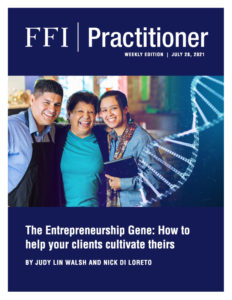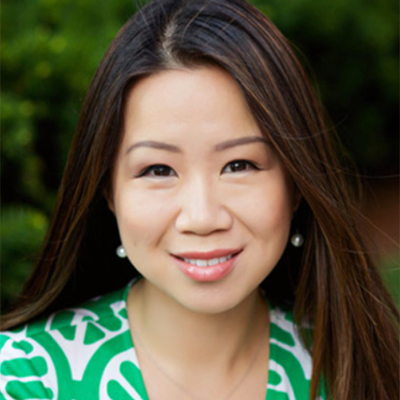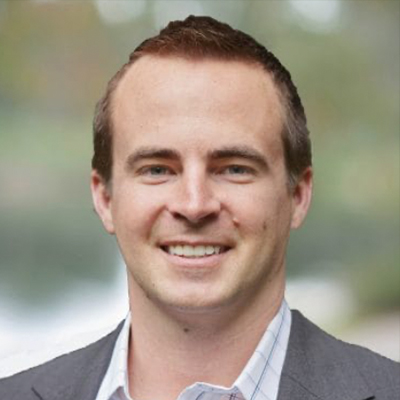
View this edition in our enhanced digital edition format with supporting visual insight and information.
Thank you to this week’s contributors, Judy Lin Walsh and Nick Di Loreto from BanyanGlobal Family Business Advisors, for their article discussing how to nurture the entrepreneurship gene in family enterprise clients. Using a case study about entrepreneur Edouard Thijssen, co-founder of Trusted Family, they share five tips for advisors to use in their practices.
Whether your client families come from a long line of entrepreneurs or are the first generation, the ultimate dream is to remain successful across generations. Among our clients, those who break the so-called “three-generation curse” are the ones who are able to continually refresh their family’s entrepreneurial spirit. It may have started with an individual with a business flair, but that’s not enough to sustain generations. Is there an inherent “entrepreneurial gene” that families either have or don’t have? Maybe. But that’s not the only way to ensure the longevity of a family business. Advisors can help their clients nurture an entrepreneurial mindset in successive generations with the right mix of support and independence.
For example, we know of one family whose legacy business was disrupted several times throughout history. Anticipating the next disruption, they created a new venture fund to back the next generation’s entrepreneurial ideas. Another family seeded a shared investment fund to teach their next generation how to invest together. In different ways, both these approaches inspired their next generation to take risks and create new growth engines.
Edouard Thijssen, a fifth-generation member of the Belgian family that owns the Aliaxis Group, experienced this firsthand. Edouard, along with his co-founder Edouard Janssen from the Solvay family, founded Trusted Family when he was in his twenties. Now CEO, Edouard shared with us how he tapped his entrepreneurial gene and leveraged his family’s support to build a successful business, while still exercising his independence.
As Edouard recalls, “My ancestors were true entrepreneurs. Belgium being a small country, they were forced to think globally early on.” From archive letters, carefully restored and passed along to each generation, Edouard first honed his “Think Global” mindset: “If you see a problem, consider how to bring a solution to the world.” And his father further inspired him “to do whatever he wants to in his life, as long as it is relevant, can be scaled, and has an impact.”
Starting in 2006, Edouard and his business partner identified a gap in how business families communicate and share sensitive information. Unlike public counterparts, privately-held businesses are not required to disclose performance to regulators. Often, closely-guarded secrets are limited to a select few. But how does that work as a family grows with each generation, and more people are involved? Their solution: Trusted Family, a secure platform to share everything from family memories to board packets to shareholder communications. Fifteen years later, Trusted Family a leading global governance platform for family businesses and offices, with over 5,000 active monthly users.
Through our conversations with Edouard and our own experience working with business families, we offer five tips that advisors can offer families to help them cultivate the entrepreneurial gene.
1. Leverage the family business as a competitive advantage.
Rather than distancing themselves from it, encourage your clients to capitalize on all the assets at their disposal. If they are fortunate to come from a family that has built a viable business, help them benefit from their predecessors’ wisdom.
One of Edouard’s greatest advantages – he realized in hindsight – was how much his elders expected of him before they would consider providing a dime. “Before, he was my dad. When I approached him about Trusted Family, he became someone with whom I had a professional relationship.” And through that relationship, Edouard was expected to navigate a rigorous process including:
- Developing a detailed business plan
- Testing it with prominent business leaders (family, family connections, cold calls)
- Building a proof of concept (a working test site for his family)
Importantly, his family offered expertise and connections, but not carte blanche. If anything, their expectations were higher than outside investors. “Several family members are entrepreneurs in their own right, so they could provide inspiration, coaching, and mentoring.” They knew what it takes to turn an entrepreneurial vision into a viable business. Had his family simply funded his venture as some sort of vanity project, he may not have forced himself to prepare as well as he did — and he might not have ended up as successful as he has been.
2. Uphold public+ standards and continually experiment.
Smart money only invests when a family venture passes the same rigorous standards as any other start-up in the public arena. If anything, among the families that nurture entrepreneurship well, we’ve found that the family’s expectations exceed that of non-family counterparts. The standard they test for is, “have you helped your clients solve their problem in a fundamentally better way? And, can it be profitable and scalable?”
Trusted Family learned over time that “clients come with a problem, not a solution. Our value is developing solutions for their problems.” As Edouard reflected, “The key is experimentation. We had an independent board member who challenged us to experiment… to define in advance what we’re trying to achieve or learn. It works or it doesn’t. But it helps to stop when an experiment is failing and know when to double down.”
3. Be personally invested and draw extra motivation from family investors.
When clients invest their own money, they have “skin in the game.” When clients ask their family members to invest too, there’s even more at stake, which can be the extra “edge” needed. Edouard secured a loan from his father to finance Trusted Family. “By creating a loan (not a gift), he forced me to think through the business model because I was responsible for repayment. And when we did our first fund raise, our families challenged us to pitch to and negotiate our valuation with other investors. After securing outsider funding, it was easier to have the family follow.”
Having family co-investors raised the stakes and expectations. Edouard didn’t want to lose what his family had entrusted to him, and that motivation helped overcome early doubts. It took 12 months to develop a viable product – the first version of their tool – and three more years to grow a sustainable client base. Today, Trusted Family’s clients include 150+ business families.
4. Apply a board approach.
Having über-talented, opinionated family members can be a blessing and a curse to an aspiring entrepreneur. They can be a font of wisdom, but an entrepreneur needs space to develop their venture. We’ve seen parents who intervene too much – usually with good intentions – but the impact is counterproductive. Some get so excited that, before they know it, they’re pitching alongside the entrepreneur to banks, they have opinions on logo design, and they want daily progress updates. What they don’t realize is that the attention in the room automatically diverts to them, which can be distracting at best, undermining at worst.
Smartly, Edouard invited his father and uncle to the board of Trusted Family. “We had a 6-7-member board right away, including family representatives, outside investors, and independent directors. They forced us to think beyond the day-to-day to a higher strategic level.” The board met quarterly, providing time for Edouard to show progress while also allowing space for the board to provide wisdom without micro-managing. It also allowed Edouard to trust his gut on operational decisions and take the board’s input in stride with his vision.
5. Honor the family legacy in your own way.
Joining the family business is not for everyone. Starting an entrepreneurial venture is a viable alternative career path that still honors the family’s roots. For Edouard, “Employment within the family business was never an option. No family members work in day-to-day operations of the business. We had to make our own way professionally.” This expectation runs counter to what many families encourage their next generation to do. But it’s the hallmark of a family that values the “entrepreneurship gene,” and not just the “entrepreneur’s legacy.” One is a “teach a man how to fish” method; the other is a “give a man a fish” moment.
Despite hailing from a prominent family, Edouard was never guaranteed a safety net. Needing to make his own path and being inspired by his predecessors activated Edouard’s entrepreneurship gene. Notably, necessity is also a powerful motivator cited by many first-generation entrepreneurs.
Edouard has demonstrated that it’s possible to build on the family’s legacy while finding your own path. His family is also trying to find ways to further stoke entrepreneurship. “We are exploring more central support for entrepreneurs, like a Family Entrepreneur Day, where family members come pitch their ideas. We want to build a database to provide ideas and contacts to other aspiring entrepreneurs.”
It is important for trusted advisors to help client families keep the big picture in mind. It won’t happen without great effort – it takes commitment and a balance of support and independence to nurture. Continuing the family legacy goes beyond working in the business; it’s about ensuring the family’s “entrepreneurial gene” lives on in successive generations.

Judy Lin Walsh advises owners of the world’s largest family businesses and family offices on generational transition. Her specialty is working in complex family ownership systems to align the goals of the senior and next generations and to build sustainable governance. Judy has written extensively for Harvard Business Review, Trusts & Estates Magazine, and Family Business Magazine on, “The Inheritance Effect”, “Should You Join the Family Business?”, and “Is Your Next Generation Entrepreneurial Enough?” Judy holds a BS in Economics from MIT and an MBA from the Tuck School at Dartmouth. She can be reached at jwalsh@banyan.global.

Nick Di Loreto is a principal at BanyanGlobal Family Business Advisors. He advises the owners of some of the world’s largest private family businesses and offices on how to navigate the challenges of generational transition. He has also been a facilitator at the Families in Business Program at Harvard Business School, has written for many leading publications including Family Business Magazine and Harvard Business Review, and speaks regularly on family business transition topics. He can be reached at ndiloreto@banyan.global.

View this edition in our enhanced digital edition format with supporting visual insight and information.





